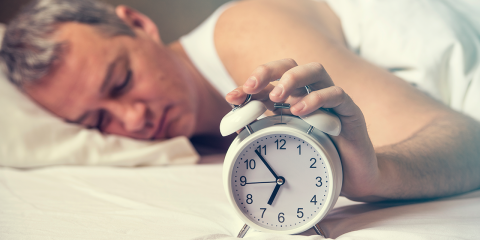Sleep has long been seen as an unproductive, fruitless and wasted time. Only babies and children were considered to need long periods of sleep. Adults were thought to be able to suffice with 3-4 hours of sleep. Sleep is an essential, indispensable physiological activity for survival. Studies have shown that during sleep countless molecular reactions and hormonal interactions take place to improve health and well-being; the body, the brain and the immune system repairs and renews themselves.
Sleep has 4 stages; non-rapid eye movements NREM 1, 2, 3, and Rapid Eye Movement (REM) stages. Sleep begins with stage 1; the consecutive phases consist of 1, 2, 3, REM, 1, 2, 3, REM, 1...with a cycle lasting 90 to 110 min. Non REM Phase 3 is the deepest sleep phase. It is very difficult to awaken a person from Phase 3 sleep, and many processes such as tissue/organ/immune system repair, functioning, and release of hormones occur at this stage. REM sleep phase is characterized by dreams; all the striated body muscles apart from the eye muscles and respiratory muscles are paralyzed at this stage, to provide safety in case we move, get up or make gestures with the effects of our dreams. Children spend more time in deep sleep, and as they get older, less time is spent in deep sleep.
During deep sleep:
- Protein synthesis takes place (proteins are the building blocks of our organs and tissues)
- Tissue damaged by stress and external factors are repaired
- Transient synapses and pathways formed in the brain during the day become permanent
- Information becomes filed, consolidated memory
- Growth hormone and the satiety hormone leptin is secreted
- The immune system is renewed.
Some people can genetically sleep less than 6 hours and continue their lives without problems, but these people are exceptions. An adult must sleep at least 7 hours, an adolescent 9 hours, and kids should sleep for 10 hours.
Reasons to sleep for at least 7 hours?
- To be happier: People who sleep less than 6 hours a night become more irritable, touchy, stressful and tired the next day. These findings are more prominent in people who constantly sleep insufficiently, predisposing them to depression and anxiety.
- To be have better cognitive function, to make better decisions: Testing sleepless subjects (even after one sleepless night) the next day reveals problems with attention, decision making, time to react to questions, and performance on memory tests. These people tested worse than people under influence.
- To increase our learning capacity and absorb knowledge: Each piece of knowledge creates new synapses and new pathways in the brain. People who sleep adequately make these connections easier and more effectively. During deep sleep these new connections are strengthened and become more permanent (become consolidated).
- To avoid accidents (while driving or at home): Significant deterioration was observed in both the attention and motor functions of subjects who were sleep deficient. These people performed worse than an intoxicated person.
- To avoid migraines and headaches: Sleep insufficiency leads to stress response in the body (cortisol release) and inflammation. Less time spent sleeping essentially means losing deep sleep, and its healing and repairing properties. Insomnia also causes a tendency for depression. All these together can trigger or aggravate migraine and headaches.
- To avoid gaining weight: During deep sleep, the satiety hormone leptin is secreted, leading to feel less hungry the next day. People with low levels of leptin crave foods containing refined carbohydrates and sugars. Another effect of insomnia is the extra release of the hunger hormone ghrelin. Sleep deprived people consumed at least 300 calories more than normal the next day.
- To be more fit: Growth hormone released during deep sleep accelerates the production and repair of striated muscles. In addition, muscle and collagen breakdown do not occur as cortisol secretion decreases with adequate sleep; skin and subcutaneous tissues appear firm and vibrant.
- For younger skin: Collagen degradation and inflammation leads to sagging and wrinkling. Getting a good nights sleep prevents this, your skin looks younger and vibrant.
- To avoid Type II diabetes: Insomnia patients have trouble controlling their blood sugar levels. The brain perceives insomnia as a stress, resulting in stress hormone release cortisol in chronic insomnia. Insulin levels in insomniac, pre-diabetic patients were found to be higher than normal the following day. Chronic stress can cause insulin resistance to develop to type II diabetes. This effect is even more pronounced in people who sleep under 5 hours.
- To lower high blood pressure and high cholesterol, to reduce belly fat: Chronic insomnia causes stress in the body and cortisol is secreted. This increases blood sugar and causes high blood pressure. The stress response and high insulin levels cause abdominal (belly fat). Insomnia and fat accumulation leads to an increase in inflammation, which, along with blood pressure, paves the way for cardiovascular diseases.
- To strengthen the immune system: We all want to sleep when we are sick and feel better after waking up. The immune system rebuilds and recharges itself during deep sleep; causing weak immune systems in insomniac patients. Even after a short period of insomnia, the likelihood of catching viral diseases such as colds and influenza increases.
- For a better sexual life: As testosterone is released during sleep and is a must for sexual performance and libido. Men are affected more from low levels. Low levels of testosterone cause low libido in both sexes, and impotence in men.


